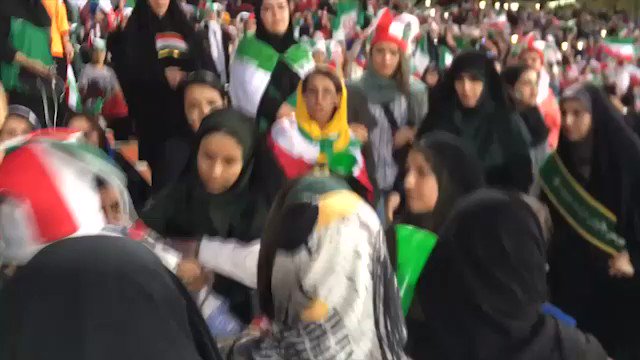Iran: Officials dispatch anti-riot units to crack down on female fans in the stadium
Special female anti-riot units stationed in Tehran’s Azadi Stadium during the 10 October 2019 soccer match between Iran and Cambodia
Reporting by PMOI/MEK
Iran, October 11, 2019—Following the entrance of a very limited number of women into Azadi Stadium in Tehran, Iran, for a soccer match between Iran and Cambodia on Thursday, October 10, on high alert for any possible protest and in an effort to install a climate of fear, the mullahs’ regime dispatched special female anti-riot units to the site to confront any scene and prevent even the slightest sign of protests.
99 people are talking about this
During the half time, members of the Iranian regime’s female anti-riot units viciously attacked and arrested a young woman in the fans who had raised a sign reading, “Blue Girl, Your Name is Eternal.” Other women at the scene attempted to free her from the agents’ grasps by chanting, “Let her go, let her go!” However, they were unable to rescue the young woman.
The “Blue Girl” is in reference to Sahar Khodayari, a young woman who set herself on fire after being sentenced to lashing and jail time for entering a soccer match of her favorite team disguised as a man.
The regime of Iran is notoriously renowned for its suppression of women's rights. Stadiums are just one of the areas where discrimination against women has become a norm in Iran. The regime treats women as second-class citizens.
The mullahs perceive any public presence of women as a threat to their laws and edicts, whose role is to preserve the state. Tehran prosecutor Mohammad-Jafar Montazeri had warned that “women’s presence in the football arena is a calculated move by the enemies.”
Iranian women are limited in their access to employment, education, arts, and the judiciary.
The regime's laws officially consider the testimony of a female witness as being worth half of that of a male witness. The regime has also institutionalized domestic violence against women, allowing husbands to treat their wives as they will. Women don't have the right to travel or work without the permission of their husband or a male relative.
But the regime's brutal misogynistic rules have turned Iranian women into a leading force for freedom and democracy. In their relentless struggle for their rights, Iranian women turned the tables on the regime and its suppressive measures.
Ever since the mullahs seized power in Iran, women have had an active role in the Iranian resistance movement by joining the ranks of the organized opposition, the Mujahedin-e Khalq (PMOI/MEK). No less than 30 percent of those executed by the regime on political charges are women. Women have also placed a leading role in thousands of protests against the regime in the past few years, including in the uprising that engulfed 160 cities in late 2017 and continued well into 2018.














No comments:
Post a Comment